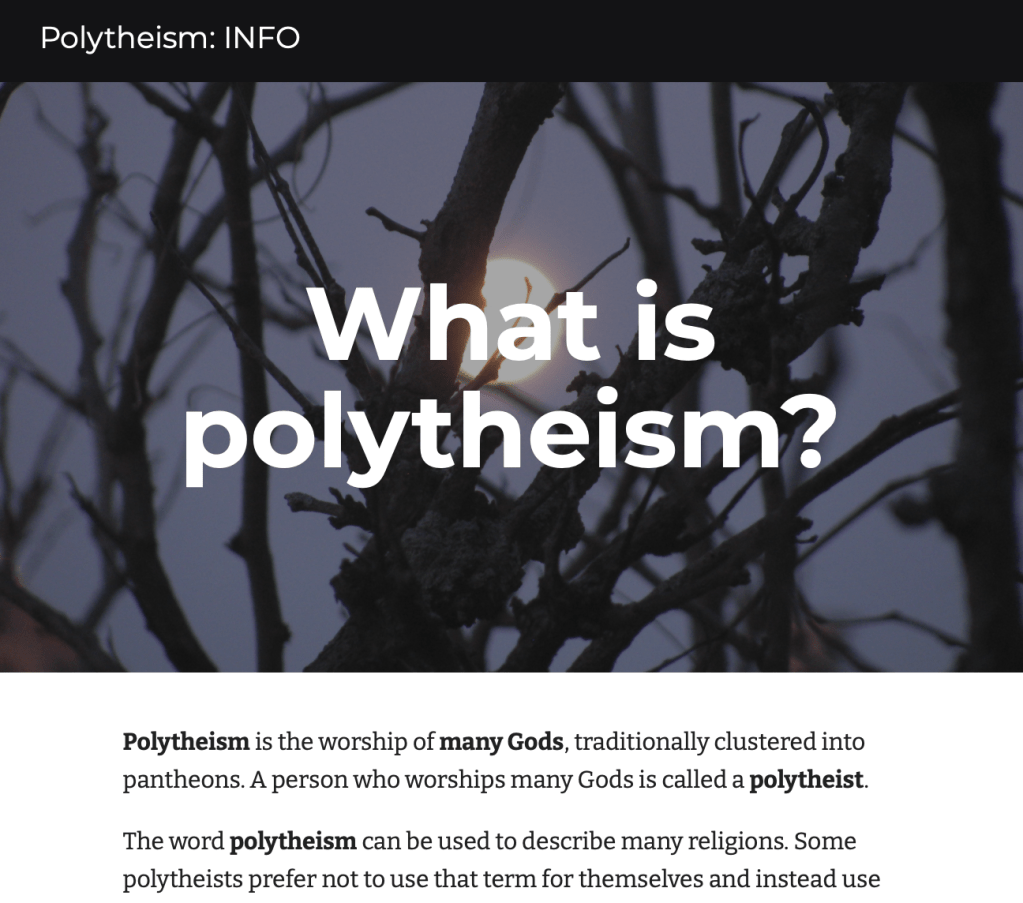I bought the domain name polytheism.info because I learned that it was available.

The page now contains a basic definition of polytheism. I tried to keep the nuance minimal. Feel free to link to this definition if you are talking to others about polytheism and searching for a summary that could be skimmed in an elevator.
While creating the page, I resisted my librarian tendency to create a long bibliography; instead, I did the (milder) librarian thing of providing a list of search terms so people who visit the page feel empowered to do their own research. The basic definition of polytheism hides so much diversity within polytheistic religions — differences that become so readily apparent when one looks for schools of thought within religions that seem so uniform to outsiders.
This basic site satisfies its raison d’être to be a basic website about polytheism. As a bonus, it is not run by evangelical Christians who say that polytheism is devoid of deep meaning and fulfillment (their polytheism-dot-net site ranks high in search results). Polytheism is many Gods, and every God is good.
💛 Enjoy. 💛

Thank you for doing this!
LikeLiked by 1 person
“Polytheism is many Gods, and every God is good.”
Yes, absolutely!
It might be worth putting this sentence, or something like it, on polytheism.info.
LikeLiked by 2 people
Great suggestion! I just added it in a roundabout way. Despite having been dazzled into the stratosphere by reading Hermias and veering into Platonism and making fun graphics of the EVERY GOD IS GOOD SOBER UP thing from the Oracles, with great power comes great responsibility! I’m worried that there may be some polytheistic religions (or philosophical schools) that wouldn’t frame this in precisely that manner, so I’m trying to stay vague-yet-firm.
LikeLiked by 1 person
I know I don’t subscribe to the ‘every God is good’ approach, though I do think every God is worthy of worship. So I appreciate this!
LikeLiked by 1 person
In Shinto, kami are not necessarily “good”: evil things can be kami. As Motoori Norinaga says,
That said, Shinto might not count as polytheism anyway, as kami are not exactly the same as gods, and also it’s said that all kami are also part of one kami.
LikeLiked by 1 person
Yes, my uncertainty was specifically related to kami because I’m not familiar with the system, but have read something similar in what I have encountered. The comment about using cultural terms was alluding to that “kami are not exactly the same as Gods” bit, as it is theologically important in many religions to use distinct divinity-terms because terminology for the divine does not have a precise crosswalk into other languages. Based on what I have read, kami seems like a term that encompasses divinities ranging from what may be equivalent to Gods to angeloi, daimones, and heroes. I’d also say the same for what I know of the Yoruba religion.
LikeLike
“what may be equivalent to Gods to angeloi, daimones, and heroes”: yes I think so, but also natural phenomena. This is a pretty good essay on the kami concept.
LikeLiked by 1 person
YAY!!!!
LikeLiked by 1 person